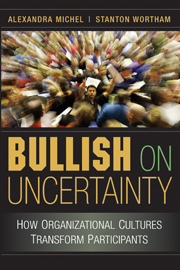PART 1 - WORK PRACTICES
Published online by Cambridge University Press: 10 January 2011
Summary
Handling uncertainty is one of top management's primary concerns, and it has been a central topic for organizational scholars since the inception of the discipline (e.g., Thompson, 1967; Lawrence and Lorsch, 1967). How organizations manage cognitive uncertainty is of great interest because this influences the organization's ability to act effectively in a dynamic environment. This section describes how decisions about managing cognitive uncertainty also influence almost every aspect of the organization and thereby influence most daily activities.
Their approaches to cognitive uncertainty influenced how both banks that we studied embarked on strategic courses of action, such as their plans for entering new markets and the organizational structures they used to coordinate bankers' activities. In Individual Bank's uncertainty reduction approach, this coordination took place among bankers who were thought of as occupants of abstract roles—individuals who operated within the organizational structures created by top management, fulfilled management's top-down directives, were trained and staffed in their areas of expertise, and received feedback on how they were performing in relation to the organization's explicit standards. This approach reduced the bankers' cognitive uncertainty by creating an internally consistent system of premises and resources that bankers could use to make decisions.
In Organization Bank's uncertainty amplification approach, coordination happened through more situated processes. Roles were merely one of many resources for action. The bankers decided on relevant participants and approaches for each situation based on the concrete cues that they attended to as they solved problems. Organizational structures were more like processes.
- Type
- Chapter
- Information
- Bullish on UncertaintyHow Organizational Cultures Transform Participants, pp. 35 - 36Publisher: Cambridge University PressPrint publication year: 2008



